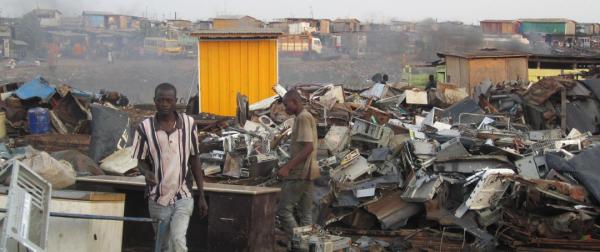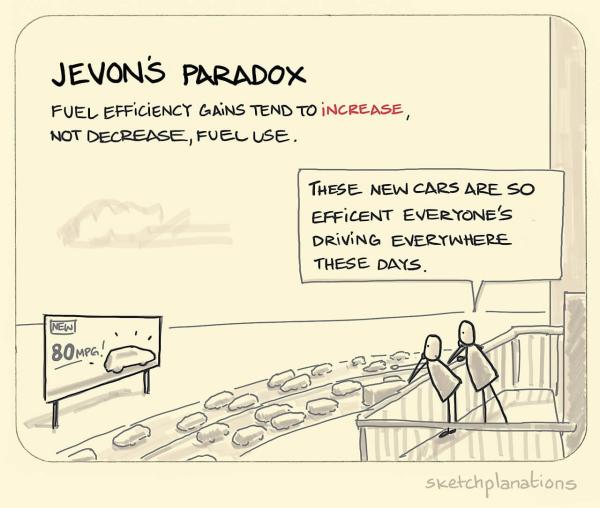IoT for Sustainable Energy? Really?
Are we sure, asks Mr. Jevons? Let’s look at the whole picture, please.

A recent article stating that the Internet of Things (IoT) Will Depend on Sustainable Energy mentions that: “the number of connected devices installed worldwide in 2025 will be over 75 billion”, that the most serious applications will be in smart cities and industries, and that “companies want to be able to establish their IoT networks and then forget about the devices themselves, working only with the data they bring in”.
While many of those devices consume very little power, the article correctly points out that:
- their total energy consumption will be “astronomical”
- ditto for the energy needed to transmit and process all the data that are generated
- equally astronomical will be the sheer amount of raw materials needed to manufacture all those devices
- finally, many of those devices could simply not use batteries
The conclusions are that:
- “IoT will depend on sustainable energy (because each device will have to get the energy it needs from the surrounding environment), but it may also help create it”
- it is important that, after an IoT network is established, it is at least carbon neutral
Now, there is no doubt that the intrinsical energy consumption of any IoT device must be evaluated together with all the energy one saves by using it. It is also true that, at least on paper, “84% of IoT deployments…” are addressing some of the UN’s sustainable development goals (SDGs)" (source).
Still, I find the article, and the overall attitude, overly optimistic and missing any mention of two crucial issues.
What about IoT interoperability and waste?
Let’s assume, even if it is far from granted in my opinion, that there are enough raw materials to build so many devices, in an age in which rationing comes to mainstream media.
The article quotes, as a good example of smart cities reducing their energy consumption, the deployment of 91k smart lights in Buenos Aires by Philips. You can read why I consider such projects NOT really smart in the long term here.

<u><em><strong>CAPTION:</strong>
<a href="https://whatis5g.info/e-waste/" target="_blank">E-waste will only increase with IoT, says 5G?IoT</a>
</em></u>
As far as waste goes… “Companies want to be able to establish their IoT networks and then forget about the devices themselves”? Really? That sounds an awful lot like “companies want license to throw billions of non-recyclable, often hard to collect objects everywhere, pollution be damned”. Think the “smart dust” I was worrying about 4 years ago, million times bigger. IoT already is the new plastic, and mindlessly accepting “over 75 billion of such objects by 2025” being scattered everywhere, without being sure they will be properly disposable is simply suicidal.
Back to energy now
A few weeks ago I wrote of how “More digital will not solve the ecological and climate crisis”. The original research I comment there is mostly about data centers, not IoT as such. However, here are a few relevant quotes, to balance the optimistic assumption that the IoT will power itself and contribute to realize the Sustainable Development Goals:
“The 100 billion connected objects projected for 2030 by Cisco have already been revised downward, and doubts have appeared as to consumers' saturation and the belief in unlimited growth, “all things being equal besides."
“at this stage, “smart” will not reduce the climate and energy crisis, and in fact, the opposite is true. No study proves that the overall assessment will be in favor of the digital. It could further aggravate the problems that it claims to solve, despite the technical solution discourses."
All around me, I see more and more signs that in the near future we will have to make and move as little physical stuff as possible, be it food or IoT devices. I also find it very likely that, unless some sort of rationing enters the picture, no saving will happen.
Instead, greed and the Jevons paradox (also known as “When doing more with less isn’t enough”) will just nullify any theoretical capability of IoT “helping create sustainable energy”. I mean, it happens every day with cars:

<u><em><strong>CAPTION:</strong>
<a href="https://www.sketchplanations.com/post/180715615931/jevons-paradox-word-on-the-street-is-that-back" target="_blank">Clik for Sketchplanation</a>
</em></u>
It happens with data centers and cloud computing: the digital sector is increasing its CO2 emissions by 8% a year, instead of reducing them by 5% a year). Why should IoT be any different, as long as its primary driver remain economic growth and stockholders gains?
Who writes this, why, and how to help
I am Marco Fioretti, tech writer and aspiring polymath doing human-digital research and popularization.
I do it because YOUR civil rights and the quality of YOUR life depend every year more on how software is used AROUND you.
To this end, I have already shared more than a million words on this blog, without any paywall or user tracking, and am sharing the next million through a newsletter, also without any paywall.
The more direct support I get, the more I can continue to inform for free parents, teachers, decision makers, and everybody else who should know more stuff like this. You can support me with paid subscriptions to my newsletter, donations via PayPal (mfioretti@nexaima.net) or LiberaPay, or in any of the other ways listed here.THANKS for your support!